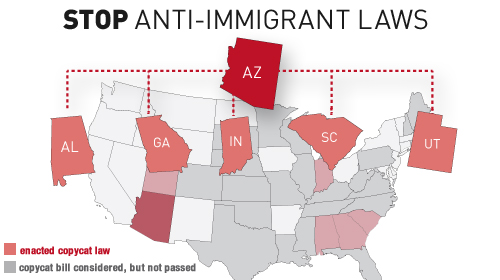ACLU Joins in Briefing Members of Congress on the Implications of Arizona v. U.S.


Today, the ACLU joined with our allies in the nation’s capital to let federal lawmakers know that Arizona’s racial profiling law, S.B. 1070, is about much more than just the state of Arizona and its immigrants. It’s about how we see ourselves as a nation.
On Wednesday, the U.S. Supreme Court will hear oral arguments in Arizona v. U.S. and it’s important to note this case will pose certain fundamental questions that members of Congress, the administration, and the public should all being weighing. Will we protect the American way of life where people of all ethnicities can live and travel, without being scrutinized by the police, or will we tolerate a police state requiring all people, including U.S. citizens, to carry birth certificates or passports at all times? Will we allow discriminatory laws on our books that will require law enforcement to profile people based on their skin color, language, or accent, or will we demand that our police administer their powers based on a person’s conduct, not on her or his skin color, language, or accent?
Two years ago today, Arizona Gov. Jan Brewer signed S.B. 1070 into law, requiring all people, including U.S. citizens, to carry “papers” at all times, or run the risk of criminal detention. Under the Arizona law, a simple act like running to the grocery store or picking up your child from school could turn into a roadside detention or trip to jail. What’s more is that S.B. 1070 has spawned a slew of copycat laws in five states — Utah, Indiana, Georgia, South Carolina and Alabama.
Supporters of these laws want to drive out Latinos by making life so miserable for them that they have no choice but to flee the state. Through these recently passed racial profiling laws, states like Arizona and Alabama are fighting for the authority to determine the racial composition of their population. During the Great Migration, we saw how Jim Crow laws drove 6 million African-Americans out of the South to the industrial centers of the North, Midwest and West, and permanently altered the composition and culture of the South. Imagine what history would have looked like back then if the federal government had continued to permit the South to erect and enforce its own discriminatory laws, and Congress and the U.S. Department of Justice turned the other way?
That’s why its clear that regardless of how the U.S. Supreme Court rules, the problems created by these laws are not confined to the states. It’s clear that the nation has reached a critical moment and the federal government must also take action. Congress, the Department of Homeland Security, and the Justice Department must terminate all federal programs and practices, including Secure Communities and the 287(g) program, that foster racial profiling of Latinos and other racial and ethnic minorities. It’s time to restore fairness and equality for all.
Learn more about anti-immigrant laws: Sign up for breaking news alerts, follow us on Twitter, and like us on Facebook.

